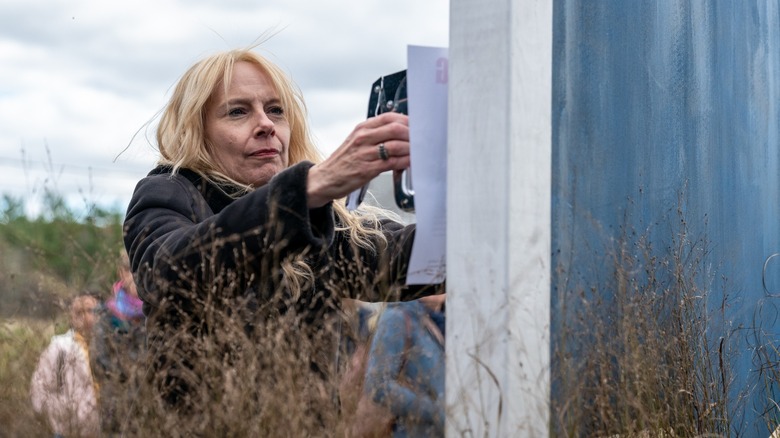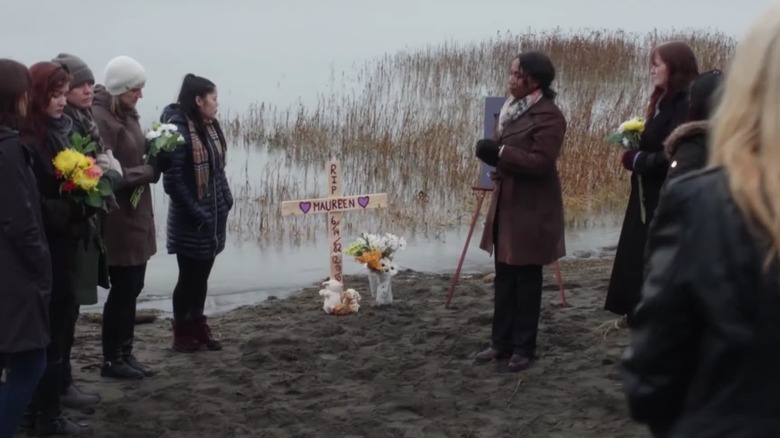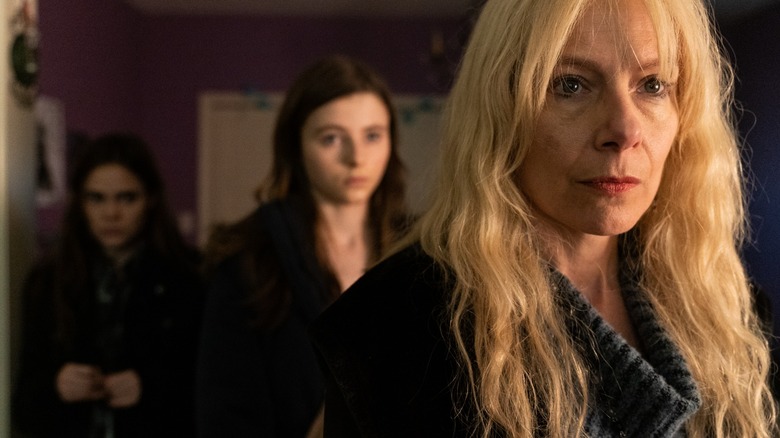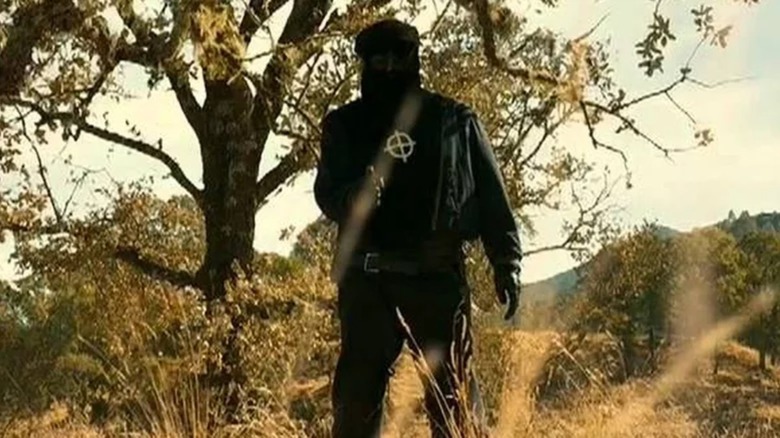Long Before A Suspect Was Arrested, The Long Island Serial Killer's Crimes Got The Movie Treatment
Content Warning: This post contains discussions of content some readers may find disturbing including misogynistic violence and police brutality.
An architect from Long Island was arrested yesterday and charged with six counts of murder related to the deaths of three women over a decade ago, per CNN. The remains of Melissa Barthelemy, Amber Costello, and Megan Waterman were all found near New York's Gilgo Beach in December 2010, along with those of Maureen Brainard-Barnes. The unidentified killer was eventually dubbed The Long Island Serial Killer, and the following year, over a half-dozen more bodies were found in the area, though police have apparently long since refused to link one to the LISK case. The man currently in custody has been charged with three deaths and linked to a fourth after investigators reportedly identified him using DNA evidence, cell tower data, and eyewitness reports.
The LISK case is deeply disturbing and upsetting. It's also an example of what the true crime genre looks like at its best and worst. Over the years, the murders have been the subject of several podcasts and documentaries, endless message board theorizing, and at least three movies. The type of storytelling described within the wide-net label of "true crime" has rightfully been the subject of scrutiny in recent years, as streamers seem to take a soulless, conveyer-belt-like approach to repackaging shocking stories and podcasts like "My Favorite Murder," which make light of the worst experiences of victims' lives. Often, there have been calls to throw the whole genre away, but interest in true crime has been around for as long as there have been newspapers fit to print about local cases.
The responsibility of true crime
It might be difficult to do away with true crime entirely, but conversations in true crime spaces have recently tried to ethically engage with the topics at hand. True crime at its worst is titillating and exploitative, or, as is the case with the recent TikTok detective craze, prone to convincing everyday people that no expertise or resources are needed to solve a case, and that public theory-sharing is little more than a game. At its best, though, it's designed to do what the systems that were meant to protect victims failed to do: Galvanizing support for vulnerable people (several of the LISK-related victims were sex workers and one may have been a trans woman), stepping up when the cops won't, and exploring the systematic injustice that leads to some cases being solved while other files sit gathering dust.
To date, at least three movies have been made about the Long Island Serial Killer investigation, and they run the gamut from one end of the true-crime spectrum to the other. The first, a nearly two-hour film that has been uploaded to YouTube in its entirety by director Joseph DiPietro, is a shoestring-budget indie movie that begins with a Giallo-like scene of a bare-breasted woman being strangled by the hand of an offscreen man. "Being a fan of cheap 70's exploitation films based on true crimes," DiPietro says in the 2021 upload's description, "I decided to bang out one about the Long Island serial killings." Though DiPietro says he didn't look into the real victims and "focused on humanizing instead of exploiting," it's pretty clear that this is not meant as a responsible telling of true events.
Two movies portray the search for a missing daughter
This type of fare is typically what true crime critics are talking about, but luckily, it's not the only version of this story that's been brought to the screen. The other two films — a Lifetime movie called "The Long Island Serial Killer: A Mother's Hunt For Justice" and a Netflix film called "Lost Girls" — both pull from the story of Mari Gilbert (the latter is adapted from Robert Kolker's investigative book of the same name). Gilbert was the mother of a 24-year-old woman named Shannan who disappeared from the town of Oak Beach, Long Island in May 2010.
Before her death, as CBS notes, Shannan made a lengthy 911 call in which the voices of two men (who were later identified) are heard, and she expresses fear for her life. Like some of the other LISK victims, Shannan was a sex worker who reportedly used Craigslist to meet up with clients, but when her body was found in late 2011, police stated (per the New York Daily News) that her death had nothing to do with the serial killer — despite the fact that 10 other bodies were all found during the period in which they were searching for Shannan. Police have said her death was likely an accident, but an independent autopsy says she may have been strangled.
When corruption thrives, someone else needs to tell the story
Mari Gilbert was dogged in her search for the truth about her daughter's disappearance, and though she herself died tragically in 2016, investigators and storytellers picked up her story and turned it into a narrative plea for attention to the case. That attention was sorely needed — as a shocking Discovery+ podcast and documentary called "Unraveled: Long Island Serial Killer" revealed in 2021, the Suffolk County Police Chief in charge of the investigation also had a whole lot to hide.
Former Chief James Burke reportedly prevented the FBI from helping with the LISK case as early as 2012. He was later sentenced to jail time after beating a man who stole a duffel bag from his car and pressuring witnesses to cover up the assault (per Rolling Stone). According to that outlet and the podcast, the man who stole the duffel bag claims it included pornography and a disturbing film that allegedly featured extreme violence against a sex worker. The podcast also includes anecdotes from interviewees about Burke harming sex workers, and CBS even reported that an escort came forward alleging that the officer choked her at sex parties held in Oak Beach back in 2011. If all of that isn't enough, former Suffolk County District Attorney Thomas Spota was also sentenced to five years in prison in charges relating to Burke's cover-up of the initial beating.
True crime can be about activism, not entertainment
As horrifying as this corruption is, it's a testament to exactly why films like "Lost Girls" need to exist. While the movie might not be considered a masterpiece on par with true crime films that plumb the depths of the human spirit like "Zodiac" or "Memories of Murder," it has an essential purpose that goes way beyond Netflix viewership or acclaim. It draws attention to a case involving people who are dismissed by society, and who need viewers at home to care about them more than investigators who can end up hurting when their job is to help. The recent movies and podcasts about Shannan and the LISK victims raised public interest in the case, and though it's unclear whether this new level of scrutiny in any way directly or indirectly led to this week's arrest, the case began seeing movement when a new police commissioner took it over last year.
The Long Island Serial Killer case is complicated and harrowing. It's full of elements that feel like they could have been pulled from a movie, from a police coverup that went all the way to the district attorney's office to the discovery of the killer or killers' dumping ground during the search for a woman whose death was ultimately ruled an accident. As we continue to learn more about the suspect who's been charged in three deaths to date, it's worth noting that the world knows about this case thanks to clear-eyed and thoroughly told stories presented by "Lost Girls," "Unraveled," and even the Lifetime film retelling. True crime can be awful, yes, but in the right hands, it can also be vital — holding those in power accountable while shining a light on those whose stories deserve to be told.




